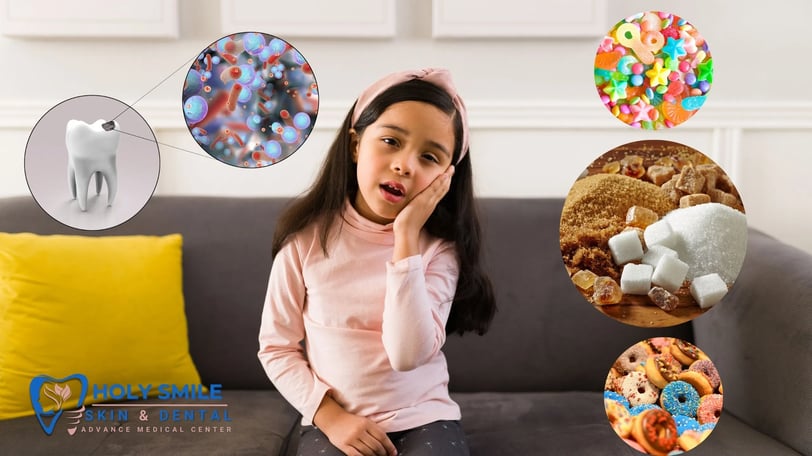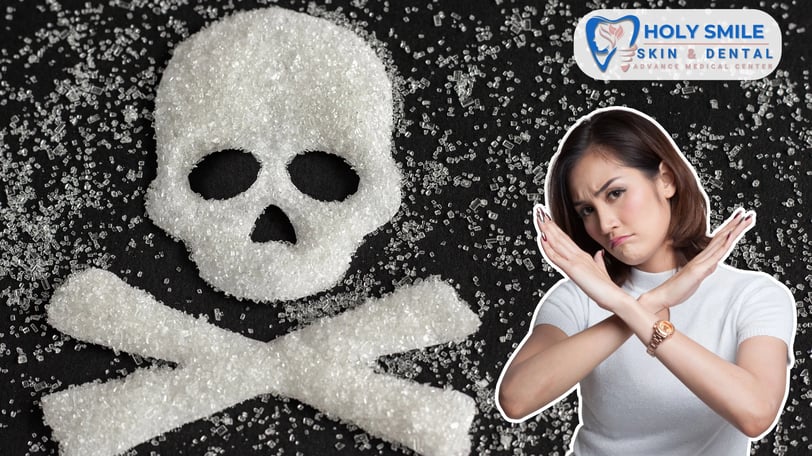Understanding the Sugar-Tooth Connection:
The bacteria naturally present in our mouths thrive on sugar. When we consume sugary foods or drinks, these bacteria produce acids as a byproduct. These acids erode tooth enamel, the hard outer layer protecting your teeth from decay. Over time, this erosion can lead to cavities, tooth sensitivity, and even tooth loss. Here's a closer look at the process:
Sugar Feast for Bacteria: When sugar enters your mouth, bacteria like Streptococcus mutans feast on it. This feeding frenzy leads to the formation of dental plaque, a sticky biofilm that coats the teeth.
Acid Attack: As bacteria consume sugar, they produce lactic acid and other acidic byproducts. These acids have a pH level lower than neutral, which means they're acidic.
Enamel Erosion: The acidic environment created by the bacteria weakens and dissolves tooth enamel. This erosion is what leads to cavities.
Warning Signs of Sugar Damage:
While regular dental checkups are crucial for early detection, here are some signs that sugar may be taking a toll on your teeth:
Increased Tooth Sensitivity: Teeth become sensitive to cold, hot, sweet, or sour foods and beverages due to exposed dentin (the layer beneath enamel).
Visible Discoloration: Early stages of enamel erosion can cause white spots or discolored patches on the tooth surface.
Pain or Discomfort: Advanced stages of tooth decay can cause significant toothaches and pain, especially when chewing or biting down.
Dr. Amit Nandi: Your Partner in Protecting Your Smile from Sugar
At Holy Smile, Dr. Amit Nandi, with his expertise in prosthodontics and implantology, understands the devastating effects of sugar on your teeth. He offers a comprehensive approach to protecting your smile from sugar damage:
Personalized Risk Assessment: Dr. Nandi will assess your individual risk factors for tooth decay based on your overall health, dietary habits, and oral hygiene practices.
Dietary Guidance: Dr. Nandi may recommend dietary modifications to limit sugar intake and promote a healthy oral diet. This may include reducing sugary drinks, processed foods, and hidden sugars in unexpected sources.
Effective Brushing and Flossing Techniques: Proper brushing and flossing techniques are essential for removing plaque and food debris before they can turn into acid and damage your teeth. Dr. Nandi will provide personalized instructions on proper oral hygiene practices.
Fluoride Treatment: Fluoride strengthens tooth enamel and helps prevent cavities. Dr. Nandi may recommend fluoride treatments in-office or suggest incorporating fluoridated toothpaste into your routine.
Regular Dental Checkups and Cleanings: Regular dental checkups allow Dr. Nandi to detect and address early signs of tooth decay before they become serious problems. Professional cleanings remove plaque buildup that brushing and flossing alone cannot reach.
Beyond Treatment: Minimizing Sugar's Impact
In addition to Dr. Nandi's expertise, here are some practical ways to minimize sugar's impact on your teeth:
Read Food Labels: Become a label-reading detective! Pay close attention to added sugars in seemingly healthy foods like yogurt, sauces, and packaged snacks.
Choose Sugar-Free Alternatives: Opt for sugar-free beverages, chewing gum, and snacks whenever possible.
Rinse Your Mouth After Sugary Treats: Rinsing with water after consuming sugary foods or drinks can help wash away some of the sugar and reduce the acidic environment in your mouth.
Chew Sugar-Free Gum: Chewing sugar-free gum after meals can stimulate saliva production. Saliva helps neutralize acids and wash away food particles, protecting your teeth.




